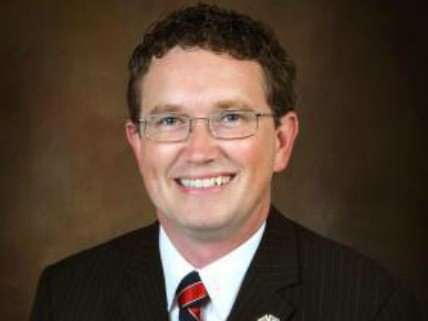Why Do Reporters Think 'Isolationist' Is a Neutral Term for People Less Inclined to Wage War Than Dick Cheney?

"Cheney Urges House G.O.P. to Abandon Isolationism" is the headline above a story in today's New York Times about a meeting between the former vice president and Republican congressmen. In the article, reporter Jonathan Weisman refers to "rising isolationism" and "isolationist voices on the rise" in the Republican Party. In all of these cases, the i-word is used without quotation marks, as a supposedly neutral description of a foreign policy position taken by certain Republicans. Yet I have never come across anyone, let alone a Republican, who describes himself as an "isolationist" or is happy to be described that way. Isolationist is an epithet that people who are quick to clamor for foreign intervention use to tar their opponents. Had Weisman matter-of-factly described Cheney and his allies as "warmongers," his editors surely would have insisted that he use a less judgmental term. So why do they think isolationist is acceptable in an ostensibly evenhanded news report?
This is not the first time the Times has carelessly tossed around the i-word, and other news outlets are guilty as well. The error is twofold. First, using the term isolationist this way implies that violence is the only way to interact with other countries: If we are not invading them or dropping bombs on them, we might as well be cutting off all contact, including trade, travel, and diplomacy. Second, the people whom the Times describes as "isolationist" are not automatically opposed to military action; they just set the bar higher than Dick Cheney does.
Who are these "isolationist voices"? The article mentions three: Rep. Thomas Massie (R-Ky.), Sen. Rand Paul (R-Ky.), and his father, former Rep. Ron Paul (R-Texas). Not one is accurately described as an isolationist.
Massie may be the least interventionist of the three. According to this 2012 campaign profile, he "opposes War in Iraq," "opposes War in Afghanistan," "opposes nation building," "opposes war unless declared by Congress," and "supports a non-interventionist foreign policy." Here is what he said after the meeting with Cheney, according to the Los Angeles Times:
I still remain skeptical. I don't think two beheadings justifies a war. I think justice is warranted, but I don't think war is warranted over two YouTubes.
And here is how Weisman summarizes Massie's position on war with ISIS:
"Constituents in my district are very war weary, and I'm war weary," said Representative Thomas Massie of Kentucky, a libertarian-minded Republican who is closely allied with Senator Rand Paul, Republican of Kentucky, and his father, Ron Paul.
To win his vote for an expanded military campaign against ISIS, Mr. Massie said, "the president would have to complete an almost impossible task, which is to convince me that he has an exit strategy and that when we're done with this third war in the Middle East, we'll be better off than we were before the third war in the Middle East, financially and politically."
These are not the words of a man who categorically opposes military action. They are the words of a man who is appropriately skeptical of the justification for this particular war.
Rand Paul, another "isolationist" mentioned by the Times, actually supports war against ISIS, albeit with congressional approval, and he has long emphasized that he can imagine circumstances in which the use of military force is justified. He supported military action in Afghanistan after 9/11, and so did his father, whom the Times also counts as an isolationist. The elder Paul voted to authorize the use of military force against Al Qaeda and its Taliban allies, although he regretted that the war dragged on for so long. (Who didn't?) Wariness of war is not pacifism, and it is a far cry from isolationism, which suggests a withdrawal from the world much more dramatic than declining to blow up certain bits of it.


Show Comments (24)